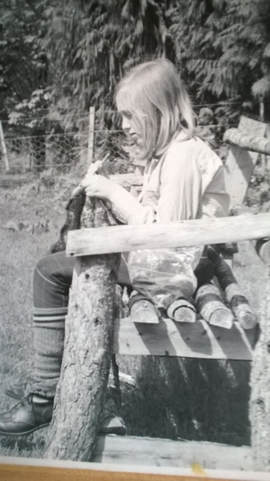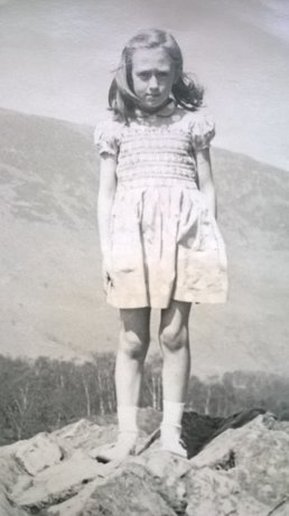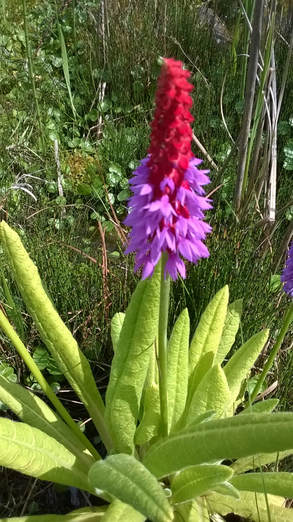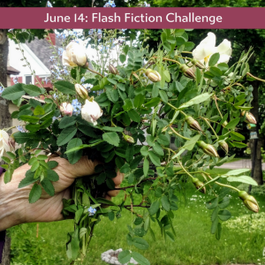| I’m in a children’s playground, awaiting my turn at the top of the slide. I sit, push off with my hands, and down I go. Wheeeee! There’s no-one to catch me at the bottom, but that’s okay. I sit and wait, scanning the faces of the grown-ups, wondering which one of them will come and claim me. It’s only as the light begins to fade that I get nervous. As the metal beneath my buttocks cools. That’s when I realise no-one’s coming, and get up to wander alone through the world. This episode came to me the way my stories sometimes do: vivid, urgent and determined to be told. But this wasn’t fiction. This was a metaphor for the origins of me. |
Therapy – and an awful lot of it – has largely taken care of that, as well as supporting me to embark on the emotionally-risky journey towards becoming a published writer. But, despite the clichés of psychoanalytic symbolism for the sex organs and birth canal, when I first related to the above story to my therapist, neither of us recognised what we subsequently agreed it was about. When we did, it opened doors to a deeper understanding of my character, and gave me an opportunity to grieve for a part of my personal story that’s beyond conscious memory.
| So if pushed to identify the experiences that made me who I am, I’d probably say the dynamics of my birth family and therapy (which I might say was like being reborn if it didn’t evoke that primal scream nonsense from the 70s). But there’s another episode in between: my ticket into therapy which I don’t talk about or write about except in heavily disguised form. If my life were a ribbon, it would be more colourful at the end with a tight knot a quarter of the way in. If my life were a railway, it would be shunted onto another track before the journey had properly got going, emerging through tunnels into postcard scenery later on. I’m happy and, while it doesn’t dilute my happiness, or not much, my loyalty to my private trauma can be awkward at times. |
I’m walking with a friend when she comments on the energy and exuberance of a group of young people nearby. I smile and walk on. She mentions it again with a subtext that we oldies must envy them and mourn our lost youth. I do have a choice about whether to speak or stay quiet, but it’s touched a raw spot within me that I don’t want to stifle. So I say it wasn’t like that for me, that I feel much fitter and freer now. Not unreasonably, she asks what happened. “I don’t talk about it,” I say.
I feel I’ve been rude, invited a visitor to my home and kept her on the doorstep, but what’s the alternative? What happened isn’t secret, but there’s no shorthand that would enable me to refer to it without feeling like I’m sticking my fingers into an open wound. I could keep it totally private, never refer to its existence, but it’s a poor form of protection that involves wearing a gag.
My dilemma feels magnified in the blogosphere where, while we must all protect our personal boundaries, a degree of disclosure forges connections across distance, genre and style. But I sometimes experience a kind of culture shock in my interactions with memoirists, despite our shared objectives of crafting our stories in an engaging way.
But somehow I can’t sit politely on the sidelines, awaiting a more congenial dance. Sometimes I manage to follow the rhythms of memoir; sometimes I have to barge in with steps that don’t fit. To assert that I disagree that sharing a story publicly is always liberating; or that such sharing is necessary or even desirable to take ownership of our pasts.
And I’ve done it again this week, although I’ve also exposed my own narcissism by making this post more personal than the dance dictates. When Irene asks What’s the biggest changes seen in your lifetime? she meant in the world beyond my skin.
| But, in answering her question as it was intended, all this preamble won’t go amiss. Sure, I’ve seen technological change, especially the marvel of the internet that brings you this post. I’ve seen political change, and not for the better, with even supposed left-wing governments indifferent to the widening gap between rich and poor. I’ve seen reason defeat religion in some quarters, with a welcome endorsement of women’s reproductive rights. The change I want to celebrate is increased emotional literacy and openness about mental illhealth, especially among the young. Sure, I might quibble with some of the interpretations – such as the notion that thinking positive is preferable to embracing both light and dark – and struggle personally with some of the implications – as outlined above – but it’s a vast improvement on my youth in the 60s and 70s. |
| Another bouquet takes me back to home territory and this week’s flash fiction prompt. Despite my preference fiction over memoir, it wasn’t easy to find my 99-word story. I’ve borrowed a thread from last week’s man glisten, in a celebration of the therapy with which I began this post. |
Tulips blooming in buckets outside the florist’s. Should I? Or would it look cheap? The entire stock can’t repay what he’s given me; besides, women don’t buy men flowers.
I walk on. Walk back. Something exotic, like an orchid? Something simple, like a single white rose?
He’d like a bouquet, he’s a sharp-suited metrosexual. He’d be embarrassed, faffing about for a vase. Or worse, he’d interpret it, force it to mean something more.
Squirming like a kid, I hold out the foxgloves, scabious and daisies scavenged from the waste ground. Rather like myself. “Thank you,” he says. And smiles.

























 RSS Feed
RSS Feed





















